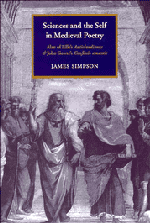 Sciences and the Self in Medieval Poetry
Sciences and the Self in Medieval Poetry Published online by Cambridge University Press: 15 December 2009
INTRODUCTION
Once the creative information of the Anticlaudianus is understood, its philosophical information (in the modern sense) looks very different. The only way to make sense of the incongruences of the poem's outer form is to read the poem in a different, artificial order. Once one reads in this way, the peculiar outer form of the poem can be explained by its inner form; equally, the inner form produces a reading of the poem as the information, or education, of a single soul. Understanding of the poem's artistic information reveals that the poem represents a pedagogic information. And this in turn modifies the evident philosophical content of the poem: as the learning experience of a single soul, the Anticlaudianus reveals how the soul both requires and structures knowledge for its fulfilment. So far from being an encyclopaedic work, a mere gathering of instructional matter, we have seen that the poem represents the teaching (or information) of a single soul. A psychology underwrites a movement through an ethics and a politics to a cosmology and a theology. Equally, the theology and cosmology point back to a politics. The poem reveals the pull between different discourses as the sciences are traversed by the individual soul.
What possible value could this set of observations have for understanding Gower's Confessio amantis, written a little over two hundred years later? There are, certainly, blocks of ‘scientific’ matter in the English poem, notably the divisio philosophiae of Book VII, but, my reader will object, the philosophic information of the poem is relatively restricted in scope.
To save this book to your Kindle, first ensure [email protected] is added to your Approved Personal Document E-mail List under your Personal Document Settings on the Manage Your Content and Devices page of your Amazon account. Then enter the ‘name’ part of your Kindle email address below. Find out more about saving to your Kindle.
Note you can select to save to either the @free.kindle.com or @kindle.com variations. ‘@free.kindle.com’ emails are free but can only be saved to your device when it is connected to wi-fi. ‘@kindle.com’ emails can be delivered even when you are not connected to wi-fi, but note that service fees apply.
Find out more about the Kindle Personal Document Service.
To save content items to your account, please confirm that you agree to abide by our usage policies. If this is the first time you use this feature, you will be asked to authorise Cambridge Core to connect with your account. Find out more about saving content to Dropbox.
To save content items to your account, please confirm that you agree to abide by our usage policies. If this is the first time you use this feature, you will be asked to authorise Cambridge Core to connect with your account. Find out more about saving content to Google Drive.